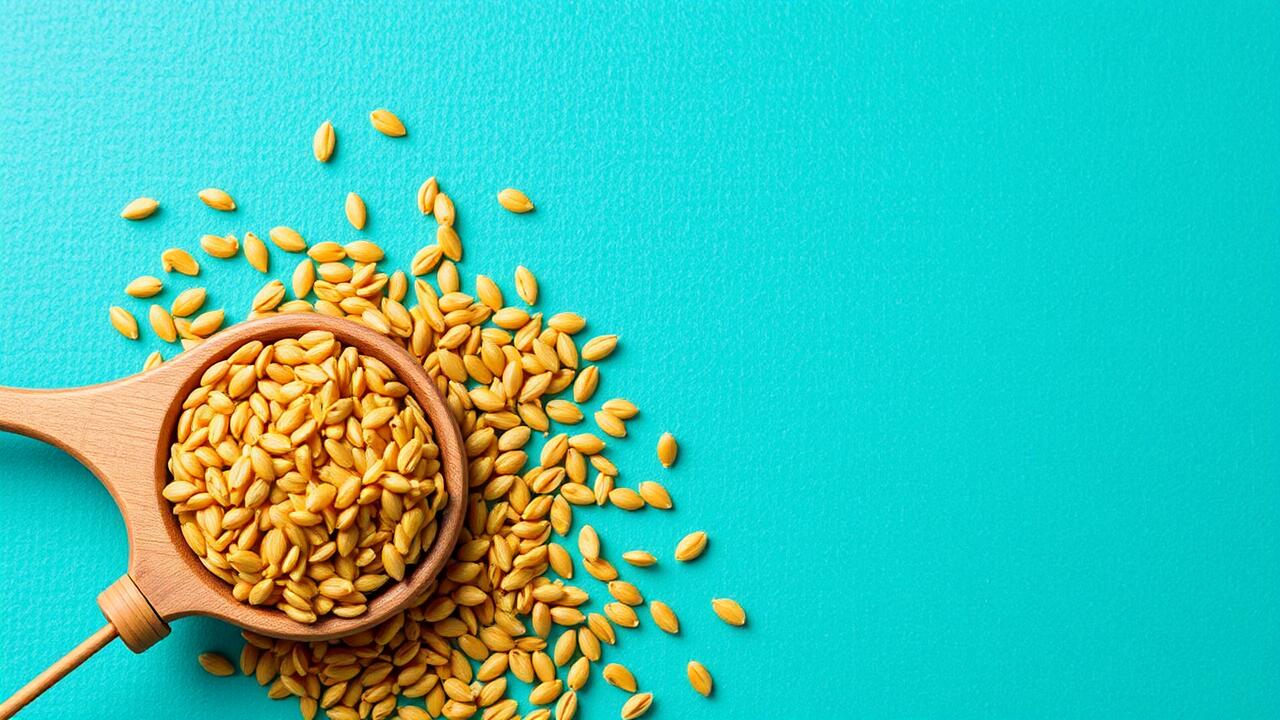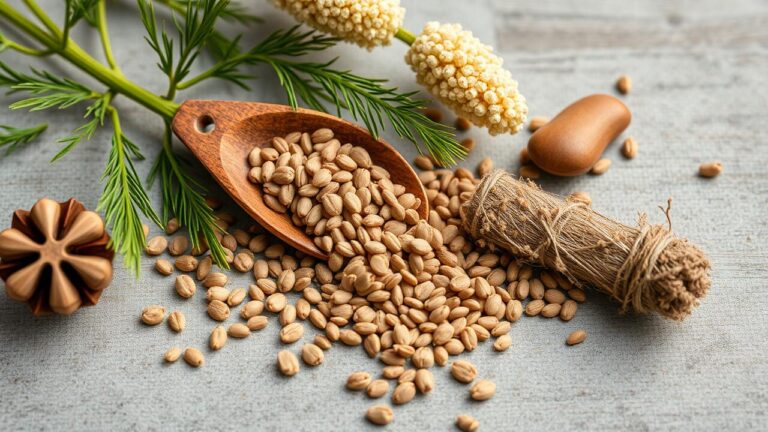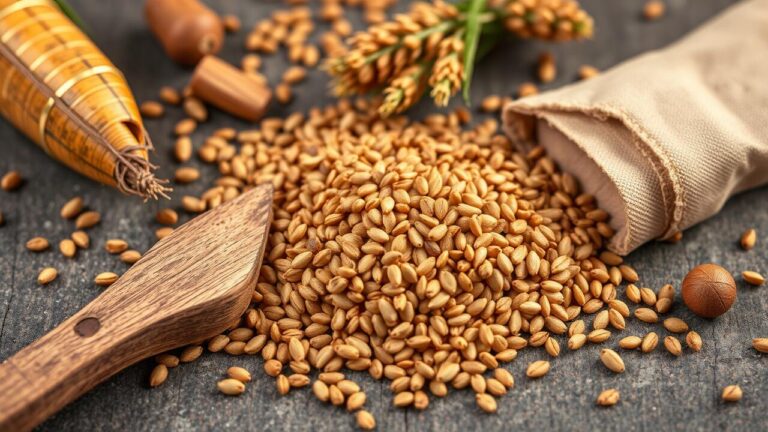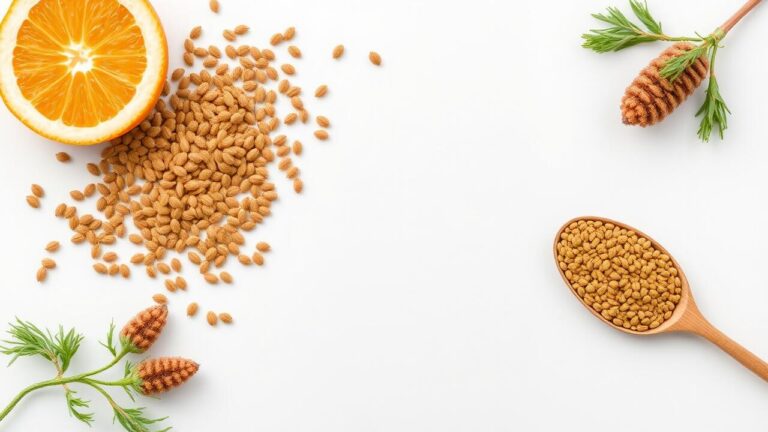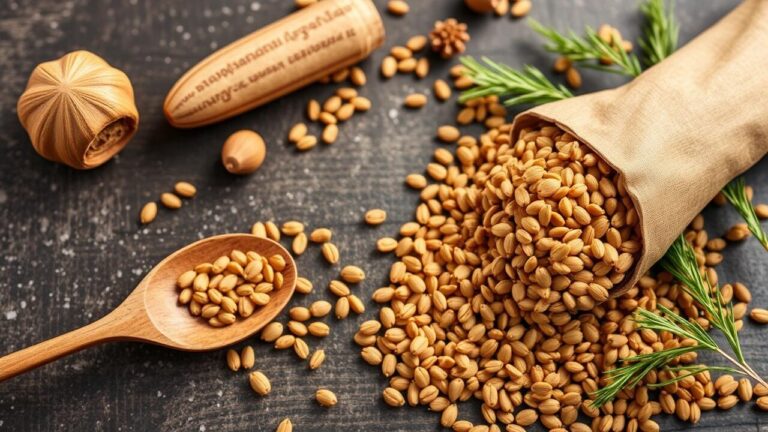Health Benefits of Flaxseed
Hormonal Balance
Flaxseed, a small but mighty powerhouse, is celebrated for its remarkable knack for supporting hormonal harmony—largely thanks to its treasure trove of lignans. These little wonders are phytoestrogens, cleverly mimicking estrogen in our bodies. This mimicry can be quite the game-changer, especially when navigating the tumultuous tides of hormonal fluctuations that often accompany menstruation and menopause.
Research suggests that weaving flaxseed into one’s daily fare might help soothe the stormy seas of symptoms linked to these hormonal shifts—think mood swings and those pesky bouts of hormonal acne that seem to pop up uninvited. By indulging in this nutrient-rich seed, individuals may find themselves better equipped to manage their estrogen levels while nurturing overall reproductive health.
Ah, the beauty of a balanced hormonal landscape! It can pave the way toward more regular menstrual cycles and ease discomfort during those challenging days. By addressing dietary deficiencies with this lignan-laden gem, folks could unlock a world where hormonal activity feels more stable and serene. The result? Enhanced well-being—and perhaps even a nifty hedge against health issues tied to hormone imbalances lurking in the shadows!
Lignans and Their Impact on Hormones
Lignans—those intriguing compounds naturally woven into the fabric of flaxseed—play a pivotal role in the intricate dance of hormone regulation. These phytoestrogens, with their uncanny ability to mimic estrogen within our bodies, may just tip the scales towards hormonal harmony, especially for women navigating the tumultuous waters of menopause. Picture them binding to estrogen receptors; it’s as if they’re moderating an orchestra where every note counts, calming some of those relentless symptoms that come with hormonal upheaval—think hot flashes and mood swings.
Diving deeper into research reveals that incorporating lignans into one’s diet could sway overall hormonal health by nurturing a more favorable balance in estrogen metabolism. This delicate balancing act might even lower the risk of conditions tethered to hormones gone awry. And let’s not forget about men: lignans may bolster testosterone levels too, potentially sharpening reproductive health and softening the blow of age-related hormone declines. Yet even as excitement brews around these mighty compounds, we stand at the precipice—a call for further studies beckons us to unravel the full tapestry of lignans’ impact and discover how best to wield their power for optimal hormonal wellness.
| Source of Lignans | Key Health Benefits | Recommended Daily Intake |
|---|---|---|
| Flaxseed | May reduce menopausal symptoms, support heart health | 1-2 tablespoons (ground) |
| Sesame Seeds | Improves estrogen metabolism, potential cancer risk reduction | 1 tablespoon |
| Whole Grains | Helps maintain hormonal balance, supports digestive health | 1-2 servings per day |
| Berries | Provides antioxidants, enhances immune function | 1 cup |
| Nuts (e.g., walnuts) | Supports reproductive health, improves heart health | 1 ounce (about 14 halves) |
Potential Cancer-Fighting Properties
Flaxseed is capturing the spotlight lately, particularly for its intriguing potential in cancer prevention. Why? Because it’s packed with lignans and omega-3 fatty acids—two powerhouses that seem to work wonders against tumor growth! Imagine this: research hints that these compounds might just help lower the risk of various cancers, notably breast and prostate varieties. Some studies even propose that lignans could play a role in meddling with hormone-driven cancers by fine-tuning estrogen levels within our bodies. And let’s not overlook flaxseed’s anti-inflammatory quirks; they may very well bolster its defenses against those pesky cancerous developments.
Take a closer look at clinical trials, and what do you find? Promising results emerge, suggesting a fascinating link between regular flaxseed consumption and reduced instances of cancer. Population-based investigations paint an eye-opening picture too—there seems to be an association between munching on flaxseed and lower mortality rates among those battling cancer. Sure, we need more research to unravel the intricate mechanisms at play here, but so far? The evidence leans toward the idea that weaving flaxseed into your daily diet could amplify your arsenal against cancer. These revelations emphasize just how vital it is to consider dietary gems like flaxseed when engaging in conversations about holistic approaches to cancer care and overall health enhancement!
Studies on Flaxseed and Cancer Prevention
Research has unveiled a fascinating possibility: flaxseed might just be a key player in the realm of cancer prevention, especially when it comes to hormone-driven cancers like breast and prostate cancer. Enter lignans—those intriguing phytoestrogens that flourish within flaxseed’s tiny seeds. They’re thought to have an impact on how estrogen behaves in our bodies. Some studies suggest these compounds could potentially diminish tumor risk by tweaking hormonal dynamics. And let’s not overlook the antioxidant prowess of flaxseed; it seems to lend a hand in battling oxidative stress lurking within us.
Clinical trials? Oh, they’ve painted an encouraging picture regarding the link between munching on flaxseed and slashing cancer risk. In particular investigations focusing on postmenopausal women, those who sprinkled some flaxseed into their diets showed lower levels of certain biomarkers tied to breast cancer. Likewise, for men, regularly indulging in flaxseed appears linked to slowing down prostate cancer’s march forward. These revelations shine a spotlight on the promising role that this humble seed may play in dietary strategies aimed at warding off cancer.
- Flaxseed contains high levels of lignans, which may help modulate estrogen levels in the body.
- Antioxidants in flaxseed may reduce oxidative stress, contributing to lower cancer risk.
- Regular consumption of flaxseed is associated with lower levels of breast cancer biomarkers in postmenopausal women.
- Men consuming flaxseed regularly may experience a slower progression of prostate cancer.
- Incorporating flaxseed into the diet can be an easy and nutritious way to support cancer prevention efforts.
- Further research is needed to fully understand the mechanism through which flaxseed affects cancer development.
- Flaxseed can be easily added to various foods, such as smoothies, yogurt, or baked goods.
Skin Benefits of Flaxseed
Flaxseed! A tiny powerhouse packed to the brim with omega-3 fatty acids and a treasure trove of antioxidants—these elements are not just good; they’re phenomenal for skin health. Picture this: improved hydration that transforms your skin into a supple, elastic canvas, ready to face the world. Imagine regularly munching on flaxseed and witnessing an enhancement in your skin’s barrier function, effectively minimizing moisture loss while fending off those pesky environmental stressors lurking around every corner.
But wait—there’s more! The anti-inflammatory magic of flaxseed swoops in like a hero, potentially easing troublesome conditions such as acne and eczema. Yes, please! Clearer complexion ahead!
And let’s not overlook lignans—the unsung champions found within these little seeds. These phytoestrogens come to the rescue by helping regulate hormone levels; crucial for tackling those annoying skin issues linked to hormonal swings. Toss in vitamins A, C, and E from flaxseed’s rich nutrient arsenal, and you’ve got yourself a recipe for vibrant skin vitality and resilience.
So why not weave flaxseed into your daily routine? It presents a natural pathway toward enhancing your skin health while tackling various challenges that may arise along the way—a simple yet transformative addition worth considering!
Effects on Hydration and Elasticity
Flaxseed, oh how it dazzles with its treasure trove of omega-3 fatty acids and lignans! These mighty compounds play a pivotal role in the saga of skin health. Picture this: omega-3s working their magic with anti-inflammatory prowess, locking in precious moisture within the skin’s layers—a dance that leads to unparalleled hydration. This elixir is not just a luxury; it’s essential for preserving the skin’s elasticity, which tends to wane as time marches on and environmental stressors loom large.
But wait—there’s more! The antioxidants nestled within flaxseed rise to battle oxidative stress, that sneaky villain responsible for premature aging. By welcoming flaxseed into your daily fare, you could be nurturing not just your complexion but also enhancing overall texture and resilience. Imagine a world where hydration meets improved elasticity, culminating in an invigorated appearance—flaxseed stands tall as a stalwart ally in any beauty or wellness crusade.
Regularly indulging in this nutrient-packed gem can unveil a complexion that’s not only youthful but vibrantly alive, echoing the myriad internal benefits bestowed by this remarkable seed. What are you waiting for? Dive into the wonders of flaxseed!
Incorporating Flaxseed into Your Diet
Flaxseed, that tiny powerhouse of nutrition, can be effortlessly woven into a plethora of meals to elevate their health benefits. Picture this: ground flaxseed—oh so adaptable! It whirls and twirls beautifully in smoothies, mingles with the warmth of oatmeal, or blends seamlessly into creamy yogurt. But wait, there’s more! Toss it into your baked creations—muffins and bread will sing with added vitality thanks to its presence. And let’s not overlook whole flaxseeds; they sprinkle delightful crunch on salads while flaxseed oil drizzled as dressing adds both zest and vital fatty acids.
Now, for those venturing down the path of nutritional adequacy, consider starting off gently—a tablespoon or two of ground flaxseed each day is a solid beginning. Incrementally ramping up your intake allows your digestive system to adapt gracefully. Just remember: hydration is key! Pair those seeds with ample fluids to keep things moving smoothly. Dive into the world of culinary experimentation—tweaking recipes here and there in daily dishes can unveil delicious ways to embrace this nutrient-packed gem in your diet!
Practical Tips and Recipes
Integrating flaxseed into your everyday meals can be a delightful adventure, brimming with simplicity and creativity. Picture this: ground flaxseed, that little powerhouse of nutrition, effortlessly blending into smoothies, oatmeal bowls, or even rich dollops of yogurt—transforming the ordinary into something extraordinary! And let’s not forget baking; swapping out a portion of flour for ground flaxseed doesn’t just amp up the fiber game—it introduces a charming nutty flavor that dances on your palate.
But wait! There’s more magic here. For those exploring vegan delights, flaxseed shines as an egg substitute: just take one tablespoon of finely milled flaxseed and mix it with two to three tablespoons of water. Let it sit until it morphs into a thick gel—a clever trick indeed!
Now, when it comes to portions—the sweet spot lies around one to two tablespoons daily for most folks. But remember this golden rule: always choose ground flaxseed over whole seeds if you want to soak up all those fabulous nutrients—those little whole seeds might just slip through your digestive system like uninvited guests at a party!
For those craving variety in their culinary escapades, consider drizzling some rich flaxseed oil over salads or cooked veggies; it’s an elegant twist on healthful dining. However, tread carefully if you have specific health concerns—consulting with a healthcare provider is wise for tailored advice before diving headfirst into the world of flaxseeds!
Possible Side Effects and Considerations
Flaxseed, a tiny powerhouse of health benefits, comes with its own set of caveats that deserve attention. Picture this: while you might be eager to embrace the myriad advantages it offers, some folks could find themselves grappling with gastrointestinal woes—think bloating, gas, or even diarrhea—especially if they dive headfirst into hefty servings. The fiber-rich nature of flaxseed means that easing it into your diet is wise; a gradual introduction can give your digestive system the chance to acclimate without turning your tummy into a tumultuous sea.
And let’s not forget those who may have pre-existing health conditions or are juggling specific medications—it’s absolutely essential to touch base with a healthcare professional before ramping up flaxseed consumption dramatically.
Now, about how much flaxseed one should aim for daily? Well, there isn’t a one-size-fits-all answer—but moderation reigns supreme when it comes to sidestepping any unpleasant side effects. Generally speaking, ground flaxseed trumps whole seeds in the nutrient absorption department; it’s like unlocking extra potential! Sticking close to recommended doses and being mindful of any allergies or sensitivities is also key.
Oh! And don’t overlook hydration! When you’re munching on fiber-packed wonders like flaxseed, keeping those fluids flowing is paramount—it can work wonders in alleviating any gastrointestinal discomfort that might try to rear its head. So go ahead and sprinkle that golden goodness wisely!
Dosage and Consumption Guidelines
When you decide to weave flaxseed into your culinary tapestry, it’s crucial to navigate the waters of recommended dosages if you want to unlock its myriad health benefits. Most adults are nudged toward a daily consumption of 1 to 2 tablespoons of ground flaxseed. This sweet spot allows for a hearty infusion of omega-3 fatty acids, fiber, and lignans—nutrients galore—without overwhelming that delicate digestive ecosystem. Ah, but here’s the twist: opting for ground flaxseed is like choosing the right key for your lock; whole seeds can slip through undigested, rendering their precious nutrients futile.
Now, don’t rush in headlong! Gradually ramping up your flaxseed intake gives your body a chance to adjust—a gentle acclimatization that mitigates any pesky digestive hiccups along the way. Start with modest amounts and let them crescendo as you become more attuned. And remember: hydration is your ally! Drinking plenty of water while indulging in this superfood will help facilitate digestion and enhance nutrient absorption.
If you’re navigating specific health concerns or dietary nuances—perhaps an allergy or intolerance—it’s wise to consult with a healthcare professional. They can illuminate the path toward finding the most fitting dosage and form of flaxseed tailored just for you!
Conclusion
Flaxseed, oh what a marvel! This tiny gem packs an impressive array of health benefits that stretch far beyond mere nutrition. With its extraordinary components—those fabulous omega-3 fatty acids and lignans—it weaves a tapestry of advantages that dance around hormonal harmony, cancer defense, and skin vitality. It’s like nature’s little powerhouse, effortlessly sliding into your meals to amp up flavor while showering you with essential nutrients.
Now, while flaxseed generally plays nice with most folks, it’s wise to stick within those golden guidelines when indulging in its goodness; overdoing it could lead to some unwanted side effects. A mindful approach to weaving this super seed into your diet can unlock a treasure trove of health perks and bolster your overall well-being. And as research continues its deep dive into the wonders of flaxseed, who knows what new revelations might surface? Its status as a must-have in any healthy eating repertoire only grows stronger!

